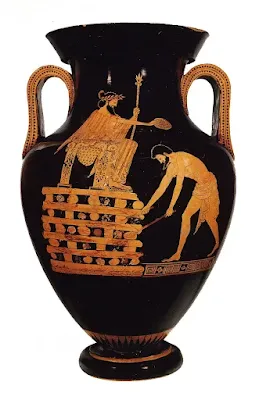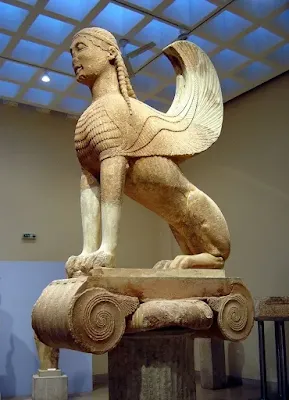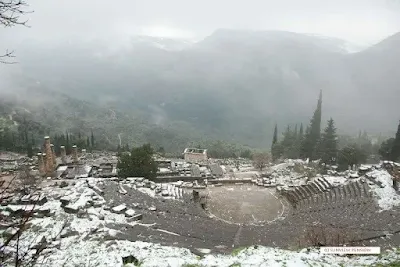
To enhance clarity regarding the chronological classification and correlation of the exhibits of the Museum, we have created a foundational table outlining the major periods of Delphi history.
1700 BCE - 1400 BCE
Worship of Gaia at Delphi

Gaia for Ancient Greeks was born at the dawn of creation. She was the personification of the Earth and one of the Greek primordial deities (protogenoi). Gaia was the original deity behind the Oracle at Delphi. Pindar (in Pythian Odes, 4. line 76) says: "That word spoken from tree-clad mother Gaia\'s (Earth\'s) navel-stone [Delphoi]." Depending on the source, Gaia passed her powers on to Poseidon, Apollo, or Themis.
circa 650 BCE
The first temple in honor of Apollo is built

595 BCE
First Sacred War
This war, between the Amphictyonic League of Delphi and the city-state of Kirrha, was fought for control of the sacred site of Delphi. The war is notable for the use of the plant hellebore to poison Kirrha's water supply, and the complete destruction of Kirrha and the sale of its inhabitants into slavery.
586 BCE
First athletic games at Delphi

The Pythian Games were one of the four Panhellenic Games of Ancient Greece. They were held in honour of Apollo at his sanctuary in Delphi every four years, two years after the Olympic Games, and between each Nemean and Isthmian Games. The Pythian Games were founded sometime in the 6th century BC. They continued until the 4th century AD.
525 BCE
The Siphnian Treasury
The islanders of Siphnos dedicated the tithe of their income from the island's gold mines to Apollo at Delphi. They buided a treasury at Delphi that was the first building made entirely by marble on Mainland Greece. The preserved decorative wealth are unique examples of Ionic architectural sculpture.

480 BCE
Persian forces attack the sanctuary of Delphi.
During the Second Persian war, the forces of the Persian Empire attacked the sanctuary of Delphi.
475 BCE
The Charioteer of Delphi
The statue was discovered in 1896 together with bits and pieces of a chariot, reins, four horses and a groom. Originally it was part of a much larger bronze sculpture erected at Delphi to commemorate a victory in a chariot race in the Pythian Games, though not to celebrate the charioteer, as we might suppose, but the owner of the chariot and the team of four horses.
458 BCE
Second Sacred War
The Second Sacred War was the Spartan defeat of Phocians at Delphi and the restoration of Delphian self-control. In 458 or 457 BC, Phocians captured three towns in the Spartan metropolis of Doris. A Spartan army marched on Doris, defeated the Phocians, and restored Dorian rule.

448 BCE
Pericles and the Battle of Delphi
During the Second Sacred War Pericles led the Athenian army against Delphi and reinstated Phocis in its sovereign rights on the oracle.

373 BCE
Destruction of the temple of Apollo
An earthquake destroys the temple of Apollo at Delphi.
356 BCE
The Third Sacred War
The Third Sacred War interrupts Delphi\'s reconstruction following an earthquake. The war was fought between the forces of the Delphic Amphictyonic League, principally represented by Thebes, and latterly by Philip II of Macedon, and the Phocians. The war was caused by a large fine imposed in 357 BC on the Phocians by the Amphictyonic League for the offense of cultivating sacred land; refusing to pay, the Phocians instead seized the Temple of Apollo in Delphi, and used the accumulated treasures to fund large mercenary armies.
279 BCE
The Galatians attack the sanctuary of Delphi.
The Galatatians attack the sanctuary of Delphi.

191 BCE
Delphi comes under Roman control.
86 BCE
Roman Sulla steals the Delphi treasures
Delphi was stripped of its treasures by General Sulla in 86 B.C. in order to finance his siege of Athens.
95 CE
Plutarch at Delphi
Plutarch was made one of the two sanctuary priests for the temple of Apollo at Delphi; the site had declined considerably since the classical Greek period. Around the same time in the 90s, Delphi experienced a construction boom, financed by Greek patrons and possible imperial support.
48 CE
Renaissance of Delphi
"Renaissance" of Delphi under Hadrian and other favorable Roman Emperors.

393 CE
the end of the Sanctuary
Last prophecy of the Oracle of Apollo at Delphi, after Roman Emperor Theodosius ordered the closure of all "pagan" sanctuaries.
1436 CE
Cyriacus of Ancona rediscover Delphi
Delphi rediscovered by the precursor Cyriacus of Ancona.
1676 CE
Delphi rediscovered
The British George Wheler and the French Jacob Spon, visited Greece in a joint expedition in 1675-76. They published their impressions separately. In Wheler's "Journey into Greece", published in 1682, a sketch of the region of Dephi appeared, where the settlement of Kastri and some ruins were depicted. The illustrations in Spon's publication "Voyage d\'Italie, de Dalmatie, de Grece et du Levant, 1678" are considered original and groundbreaking.
An early photo of the excavation in progress with the Athenian stoa and temple terracing wall emerging from underneath the modern village of Kastri.
1903
Inauguration of the Delphi Archaeological Museum
Inauguration of the Delphi Archaeological Museum
Basic chronological periods of Greek history
2000 BC to 1600 BC Neolithic period.
1000 BC to 800 BC the "Dark Ages" of Greek history.
800 BC to 500 BC Archaic period.
500 BC to 333 BC Clasic period.
333 BC to 30 BC Hellenistic period.
30 BC to 330 Roman period.
330 to 1453 Byzantine period.
1453 to 1821 Ottoman occupation.
from 1821 Modern Greece.


























